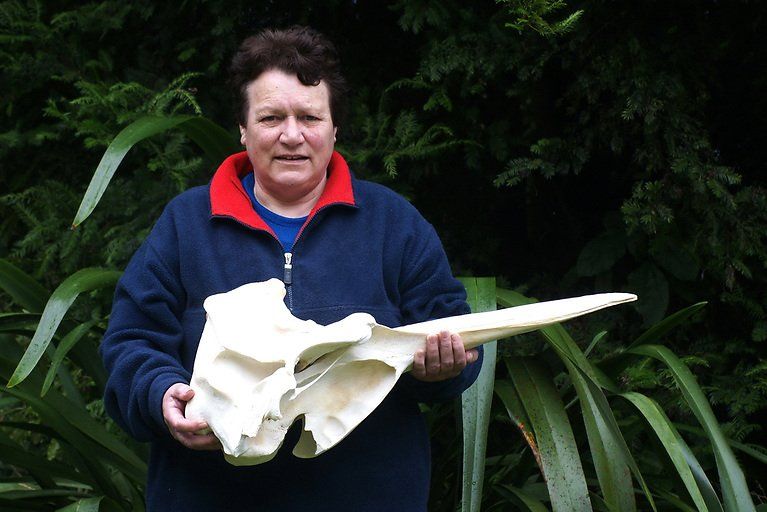The Ecological Frontier: A new species of a deep-sea beaked whale discovered in the Southern Hemisphere.
The Ecological Frontier: A new species of a deep-sea beaked whale discovered in the Southern Hemisphere.
ORCA SciComm Team | 3rd of November 2021.
Irish marine mammal experts were part of a discovery of a new whale species, named Ramari's beaked whale, the first cetacean to be named after an Indigenous woman. The new whale was named after Ramari Stewart, a Mātauranga Māori whale expert, while its scientific name, Mesoplodon eueu, refers to its indigenous roots in South Africa. The newly discovered species diverged from the previously described True’s beaked whale, a new study has revealed.

In 2011, a pregnant beaked whale stranded on the coast of New Zealand and was identified as a True's beaked whale, with her skeleton preserved at the Te Papa Tongarewa Museum in Wellington thanks to the help of Ramari Stewart, a Māori whale expert, who noticed something different about the specimen.
In a new paper in the
Proceedings of the Royal Society of Publishing,
researchers from around the world, including Prof. Emer Rogan from University College Cork (UCC) and colleagues used genomic and morphometric analysis to demonstrate evolutionary divergence between Ramari’s beaked whale (M. eueu) and True's beaked whale (M. mirus) from the North Atlantic. Morphometric analyses of skulls of the two species also showed distinguishing characteristics. Genome sequencing of archival specimens and international collaborations allowed the divergence of two deep-diving species to be revealed. The study was led by Dr. Emma Carroll of the University of Aukland, who compared other samples of True’s beaked whales from both the Northern and Southern hemispheres and noticed the difference between skull shapes and genetics - two key indicators that these were in-fact different species.
Genomic analysis revealed a number of molecular characteristics that were found to be different in Ramari’s beaked whale in comparison to True’s beaked whale, based on a number of DNA markers, including mitochondrial mtDNA data which included sequences from the holotypes of both Ramari’s beaked whale and True’s beaked whale at all sequence lengths. At the full mitochondrial genome lengths, Ramari’s beaked whale was distinguished by 579 fixed differences that were significant from True’s beaked whale. Further nuclear DNA analysis; reduced representation sequencing with ddRAD showed that True's and Ramari's beaked whale were distinguished by 1909 fixed differences, across a dataset of 15,671 SNPs found between or within both species. Comparison of one whole nuclear genome each from True’s and Ramari’s beaked whales showed a level of nucleotide divergence of 0.28%.
Morphological characteristics were also examined, with Ramari’s being the larger (5.3 m) species of
Mesoplodon differing from all other members of the genus except
True’s, in having tusks positioned at the tip of the mandible. However, Ramari’s beaked whale also differs from other species such as True’s and Hector’s beaked whale in having smaller, less triangular tusks and from True’s beaked whale in having a relatively shorter rostrum with a wider base, a shorter mandibular symphysis, wider premaxillary sac fossae and crests, and a taller cranium.

Upon examination of external appearance between Ramari’s beaked whale and True’s beaked whale, they are difficult to distinguish, as both species are ”rotund mesoplodonts” with torpedo-shaped bodies that taper towards the tail and beak, with somewhat bulbous melons, and a straight short beak. Coloration patterns are generally grey with a dark eye patch, however, there may be specific coloration patterns linked with Ramari’s beaked whale, however, are yet to be conclusively described.

Up to 1.5 million species await discovery in the deep sea. This study highlights how detailed analysis of even a small number of samples can provide profound insights into the diversity and phylogeography of the species that occur in our vast oceans. As one of the few mammalian deep sea specialists, beaked whales may be among the most diverse cetacean lineages. The results of this ground-breaking work support the idea that the deep sea is more biodiverse than previously considered. Modeling of deep-sea biodiversity suggests peaks at 30–50° latitudes, coinciding with the ranges of Ramari’s beaked whale and True’s beaked whale. As the deep-sea habitats are influenced so strongly by temperature and primary productivity, the study used time-calibrated phylogenetic reconstruction of the mitogenomes to conclude an initial divergence between the two species circa. 2 million years ago and the slightly greater generic diversity and the vast range of Ramari’s beaked whale may indicate a southern origin. In addition to the discovery of the species in New Zealand, this whale has also been identified off Australia and South Africa.

Ramari’s beaked whale and its scientific name (Mesoplodon eueu) acknowledge links with Indigenous communities in South Africa and Aotearoa New Zealand. The chosen common name, “Ramari”, pays homage to Māori tohunga (expert) Ramari Stewart, who; “has kept traditional knowledge alive, contributed extensively to scientific research on marine mammals, and helped prepare the skeleton of the holotype”. It was also selected as it means a rare event in the Māori language, reflecting the elusive nature of most beaked whales.
Ramani’s beaked whale is the 5th beaked whale species to be discovered in the past few decades, bringing the total number of beaked whale species to 24, but as they occur in deep offshore waters, spend little time at the surface where they are difficult to distinguish from True’s beaked whale, this study confounds the importance of including genetic and morphometric analysis to gain further taxonomic insights of these elusive animals. This study also highlights the value of museum and tissue archives in documenting and understanding speciation.
Reference:
Carroll et al. (2021) Speciation in the deep: genomics and morphology reveal a new species of beaked whale Mesoplodon eueu. Proc. R. Soc. B 288: 20211213. https://doi.org/10.1098/rspb.2021.1213
SHARE THIS ARTICLE













